How Electronics Engineers Can Successfully Learn Coding in 2025 – New IoT & software Guide
As an electronics engineering student, I was super confident working with hardware building circuits, connecting sensors, and making things happen in the physical world. My project, a water quality sensing smartwatch, was moving along just fine until I hit the software part. All I knew was how to blink an LED or print a few lines on a screen.
I almost asked a software student to do it for me or considered switching to an easier project with code I could just copy. But deep down, I wanted to fully understand everything myself. That’s when I decided to take a full-stack software development class.
Looking back, full-stack wasn’t really the path that matched my actual reason for learning to code. My main goal was to build solid software for my hardware projects, not to develop entire web applications. Even though the journey was way bumpier than it needed to be, the experience turned out great, it gave me valuable coding skills I wouldn’t trade for anything.
Still, I can’t help but think: if I had the right guide from the start, my whole learning strategy could have been more focused, less confusing, and honestly, a lot smoother. That’s exactly why I’m writing this blog, for electronics engineers like you, who want to confidently build both hardware and software without wasting time figuring everything out the hard way. This is the step-by-step guide I wish I had.
Figure Out Why You Want to Learn Coding as an Electronics Engineer
The most important place to start isn’t picking a language or choosing a course, it’s figuring out why you want to move into software in the first place. Trust me, this step is what will make your learning path so much clearer.
Ask yourself:
👉 Are you completely new to coding and need to start from scratch?
👉 Do you want to level up your skills so you can confidently write full IoT project code from start to finish?
👉 Or maybe you just want to finally understand all those IoT code examples out there instead of blindly following them?
👉 Or are you actually considering a full career shift into software?
Be honest with yourself here, your reason matters. It shapes what you’ll focus on, the tools you’ll use, and the learning style that will work best for you.
For me, my main goal was to build software that could power my hardware projects. But I took a path meant for people switching fully into software development. It still turned out well, but knowing exactly why I was learning could have saved me time and helped me find a better starting point.
So before you dive into tutorials, bootcamps, or coding schools, take a beat to really understand your why. It’s what’s going to keep you focused, motivated, and moving in the right direction.
Choose the Right Coding Path for Electronics Engineers
Once you understand why you want to learn coding, the next step is to choose the right learning path based on your specific goals. This is where many electronics engineers, including myself, get misaligned. Selecting the wrong path can slow you down or lead you to spend time building skills that may not directly serve your primary objective.
This section provides a clear guide on where to start based on your goal, so you can begin with purpose and direction.
Best Path for Electronics Engineers Working with Arduino, Raspberry Pi, or ESP32 (IoT and Embedded Coding)
If your focus is on building IoT systems, working with microcontrollers, or programming devices like Arduino, Raspberry Pi, or ESP32, you need to build both low-level and high-level coding skills. These platforms are popular, accessible, and powerful tools for electronics engineers. I would recommend:
- Start with Python Basics
Python is widely used with Raspberry Pi and is perfect for handling sensor data, device control, and cloud communication in IoT systems. - Learn C/C++ for Embedded Systems
C/C++ is the core language for programming Arduino, ESP32, and similar microcontrollers. It helps you control hardware at a low level, write efficient code, and build reliable embedded systems. - Work with IoT Boards Directly
Get hands-on experience with Arduino IDE, ESP-IDF for ESP32, or Raspberry Pi OS to write, upload, and test your code directly on the boards. - Understand Cloud Platforms (Firebase, AWS IoT)
Cloud integration allows your devices to store data remotely, communicate in real-time, and scale across networks. - Study Basic Databases (SQL or MongoDB)
Knowing how to manage and structure data is essential for building complete IoT applications that collect and analyze sensor data.
Why This Path Matters:
This is the most direct and effective path for electronics engineers who want to stay close to hardware while becoming fully capable of writing the software that powers their devices.
It gives you the foundation to create smart devices, connect them to the internet, and manage them through cloud platforms.
Over time, this path can prepare you for advanced fields like:
- Machine learning on microcontrollers
- Edge computing for real-time processing
- Smart system automation
This is the coding roadmap that can truly empower you to design, build, and program your own IoT systems confidently.
Best Path for Electronics Engineers Specializing in Machine Learning and Data Science (Python, TensorFlow, AI)
If you are interested in designing smart systems that can collect, process, and make decisions based on data, specializing in Machine Learning (ML) and Data Science is a powerful choice. These skills are especially valuable when combined with your electronics background, as they can help you build intelligent IoT devices and smart automation systems.
- Python for Data Science: Python is the standard language in this field.
- Pandas and Numpy: Essential libraries for handling and analyzing large datasets.
- Machine Learning Basics: Learn frameworks like TensorFlow or Scikit-Learn to build basic machine learning models.
Why This Path Matters:
This path equips you with the skills to design intelligent, connected systems that can adapt, learn, and improve over time.
As electronics engineers, moving into machine learning and data science allows you to:
- Build smart IoT devices that can process and act on data independently.
- Design predictive maintenance systems for electronics hardware.
- Develop automation solutions that are not just programmed but can learn and optimize performance.
Machine learning brings a new layer of intelligence to your hardware projects. You won’t just be building devices that collect data, you’ll be building systems that can understand, predict, and solve real-world problems.
This learning path also sharpens your problem-solving skills and helps you grow as a versatile engineer who can work confidently across hardware, software, and data.
By choosing this route, you open doors to exciting fields like artificial intelligence, robotics, and smart system design, areas that are rapidly shaping the future of engineering.
Best Path for Electronics Engineers Transitioning Fully to Software Development (Full-Stack Coding Career Shift)
If your primary interest is to shift from electronics to software engineering and build full web or mobile applications, a full-stack development path is what I would highly recommend.
- Frontend Development: Learn HTML, CSS, JavaScript, and React to build user-facing applications with clean, interactive interfaces.
- Backend Development: Learn Node.js, Python, and database management (SQL or MongoDB) to develop server-side logic and handle data storage.
Why This Path Matters:
This route opens up broad opportunities in web and mobile application development. It is ideal if you are planning to step away from hands-on hardware work and focus fully on software engineering.
Personal Note: This is the path I chose. While it greatly improved my coding skills, it was not fully aligned with my initial goal of coding for IoT. I recommend choosing this path only if you genuinely want to pursue a long-term career in software development.
Where to Start Learning Coding: Choose Your Guided Learning Journey
Now that you’ve found your why and picked your coding path, it’s time to figure out where you should actually begin learning. But here’s the thing: how you learn matters just as much as what you learn.
Not everyone learns the same way. Some people grow best when they’re figuring things out solo, others need structured support, and some are still exploring what fits.
This blog is here to guide you to the starting point that feels right for you: no guesswork, no overwhelm.
Let’s help you choose your personalized learning journey.
Option 1: You’re a Self-Learner
If you love exploring things on your own, moving at your own pace, and switching up your learning when curiosity hits, this is your vibe.
Check out the blog: https://zinduaschool.com/learn-coding-for-free/
This blog will guide you to trusted platforms where you can start learning coding on your own, step-by-step, without pressure.
This works best if:
- You’re balancing school, work, or other commitments.
- You like controlling your own learning schedule.
- You prefer discovering and experimenting as you go.
Even when you’re self-learning, don’t go at it totally alone. Connect with coding communities on Discord, Reddit, or LinkedIn. You’ll find support, answers, and people who get what you’re going through.
Option 2: You Learn Best with Structure
If you prefer having a teacher, classmates, and clear deadlines to keep you focused, structured learning might be your sweet spot.
Dive into the blog:https://zinduaschool.com/best-coding-schools-in-kenya/
This blog will guide you to schools that can offer mentorship, peer support, and the structure you need to grow fast and confidently.
This is perfect if:
- You need accountability to stay consistent.
- You like learning through collaboration and class discussions.
- You’re energized by having classmates and real-time feedback.
Before choosing a school, reach out to past students to hear what the experience is really like, that’s where you’ll get the real, unfiltered feedback.
Before choosing a school, reach out to past students to hear what the experience is really like, that’s where you’ll get the real, unfiltered feedback.
Option 3: You’re Still Exploring
If you’re just out of high school, thinking of switching careers, or still trying to figure out your best move, that’s totally valid. You don’t need to have all the answers yet.
Explore the blog:https://zinduaschool.com/coding-bootcamps-vs-degree-vs-online-courses/
This blog will walk you through the pros and cons of each path so you can make a smart, confident decision about your next step.
This is your go-to if:
- You’re not sure whether to choose self-learning, coding schools, or university.
- You want a breakdown of cost, time, and career opportunities for each option.
- You need help comparing different learning journeys in one place.
It’s okay to mix learning styles. You can self-learn now and join a bootcamp later. Your journey doesn’t have to be one-size-fits-all.
Whether you choose to self-learn, join a coding school, go to university, or build your own custom mix, the most important thing is to start. You can figure things out along the way.
Learning to code as an electronics engineer will unlock powerful doors. You’ll gain the skills to design real solutions, confidently build hardware and software systems, and solve problems that matter in the real world.
Conclusion
Learning to code as an electronics engineer isn’t just a “nice-to-have” anymore, it’s your power move. Whether you’re building smart devices, diving into machine learning, or switching to full-stack development, coding is the tool that will unlock your next level.
The most important thing?
Start where you are.
Learn in a way that fits you.
Keep moving, even when it gets hard.
When I started, I was just trying to figure out how to program my water quality sensing smartwatch. I didn’t know much, but I kept learning, coding microcontrollers, working with sensors, and step by step, I got it done. Today, I’ve grown from an intern to a technical mentor, and I’m now teaching my first class while still learning new skills in DevOps. It’s been a journey, and I’ve never been happier.
That’s why I’m sharing this because I know what’s possible when you stick with it. Your journey doesn’t have to look like anyone else’s. You can self-learn, join coding schools, explore university, or mix it all up, and that’s perfectly okay. Progress isn’t always a straight line. Sometimes you’ll pivot, pause, or even feel lost. That’s part of the process. Trust me, you’ll find your rhythm.
If I could give you one piece of advice from my own story, it’s this: stay curious and be patient with yourself. The skills will come, the confidence will grow, and soon you’ll look back and realize you’ve built something incredible.
The future belongs to engineers who can confidently blend hardware and software and that can absolutely be you.







